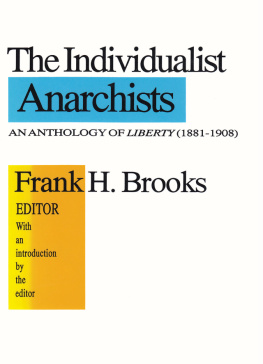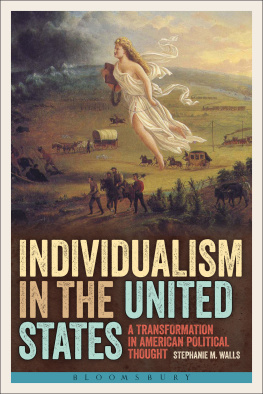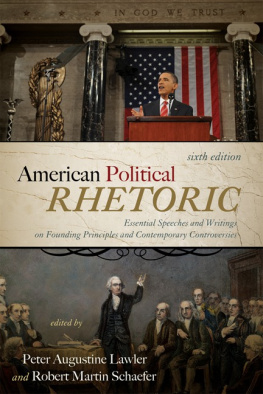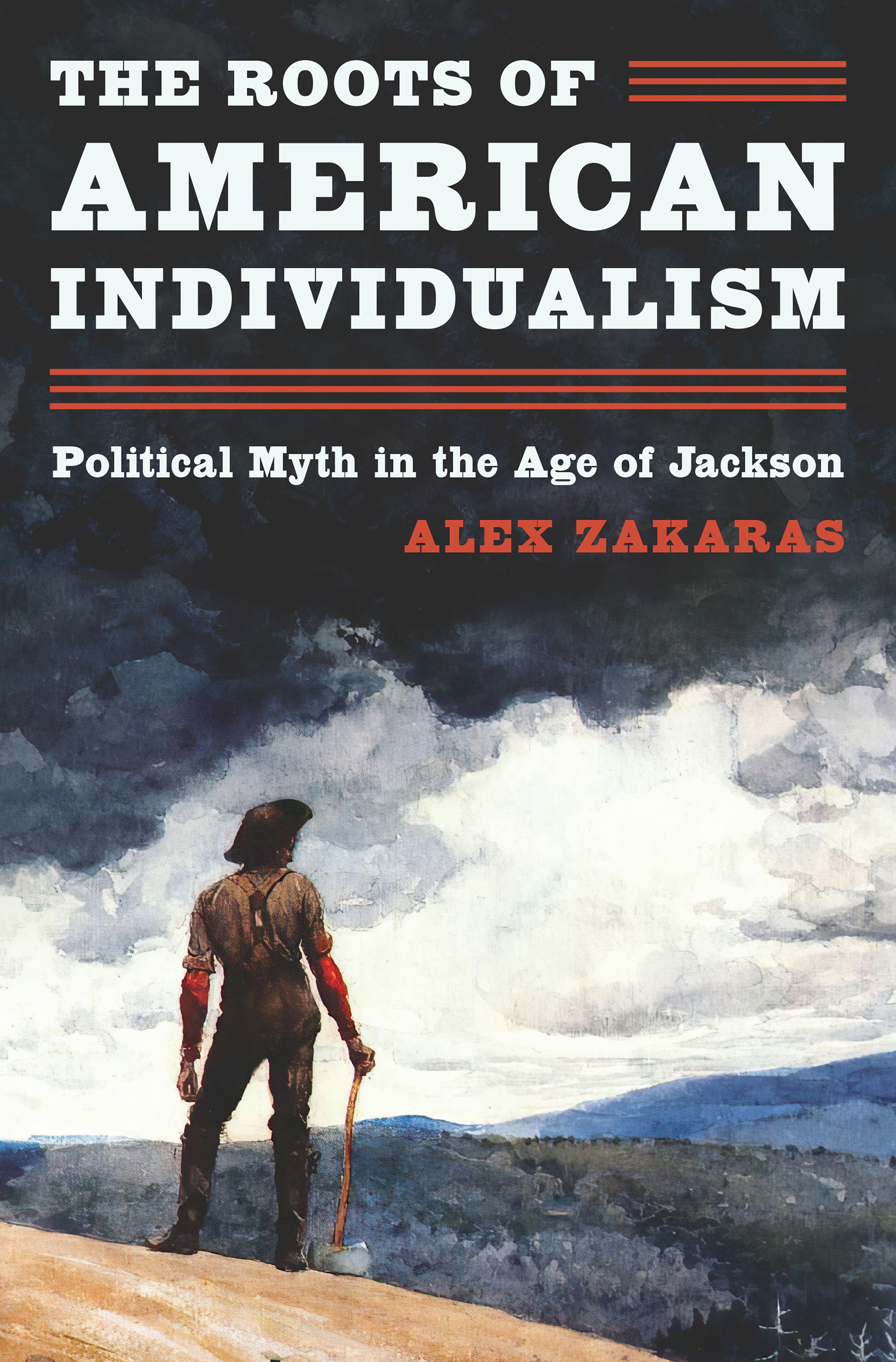THE ROOTS OF AMERICAN INDIVIDUALISM
The Roots of American Individualism
POLITICAL MYTH IN THE AGE OF JACKSON
ALEX ZAKARAS
PRINCETON UNIVERSITY PRESS
PRINCETON & OXFORD
Copyright 2022 by Princeton University Press
Princeton University Press is committed to the protection of copyright and the intellectual property our authors entrust to us. Copyright promotes the progress and integrity of knowledge. Thank you for supporting free speech and the global exchange of ideas by purchasing an authorized edition of this book. If you wish to reproduce or distribute any part of it in any form, please obtain permission.
Requests for permission to reproduce material from this work should be sent to
Published by Princeton University Press
41 William Street, Princeton, New Jersey 08540
99 Banbury Road, Oxford OX2 6JX
press.princeton.edu
All Rights Reserved
ISBN: 978-0-691-22631-6
ISBN (e-book): 978-0-691-22630-9
Version 1.0
British Library Cataloging-in-Publication Data is available
Editorial: Rob Tempio and Chloe Coy
Production Editorial: Jenny Wolkowicki
Jacket design: Karl Spurzem
Production: Erin Suydam
Publicity: James Schneider and Carmen Jimenez
Jacket image: Winslow Homer - Woodcutter 1891. Artefact / Alamy Stock Photo
For Tess
CONTENTS
- ix
ACKNOWLEDGMENTS
IN THE EIGHT YEARS it took me to write this book, I benefited immensely from the help and generosity of others. I had four terrific undergraduate research assistants, each of whom contributed valuable evidence and detail to the manuscript: Sophia Billias, Brendan Hersey, Carrie Madden, and Audrey Oliver.
My colleagues and my department at the University of Vermont have been consistently supportive and encouraging. I want to thank Bob Taylor and Patrick Neal in particular, who helped me think through all stages of this project and who read and commented on drafts of each and every chapter. Amani Whitfield offered me very helpful advice and feedback on many different parts of the manuscript. Melanie Gustafson gave me incisive comments on and pointed me toward relevant literatures.
I received funding from the University of Vermonts Humanities Center, whose support in 201920 allowed me to make valuable progress on the manuscript in its later stages. I also benefited from a generous grant from the Louis Rakin Foundation, which enabled me to organize a manuscript workshop in 2019. Im grateful to the Yale Department of Political Science and to Steven Smith in particular for hosting me during my sabbatical in 201314.
A number of scholars beyond UVM read part or all of the manuscript, and I learned a great deal from their comments and suggestions. I want to thank Joshua Lynn most of all for his sustained and detailed comments on the entire manuscript. Josh was exceptionally generous with his timeand his considerable expertiseover the last several years. Along with Amani and Josh, Harry Watson, Jason Frank, and Timothy Breen also participated in my manuscript workshop in the summer of 2019, and each gave me excellent feedback and adviceI am very grateful to all three. Many others have read and commented on chapters of the manuscript over the years, including Will Barndt, Eric Beerbohm, Josh Cherniss, Yiftah Elazar, Bryan Garsten, Lisa Gilson, Michael Lienesch, Luke Mayville, Susan McWilliams, Danilo Petranovich, Jim Read, Jeff Sklansky, Steven Smith, and Jack Turner.
I am deeply grateful to the librarians at the University of Vermonts Howe Library, who provided substantial help and support throughout this project. I am especially indebted to Lisa Brooks and Sarah Paige, who tracked down countless obscure sources for me.
Special thanks, also, to Rob Tempio at Princeton University Press, who believed in this book and helped me bring it to fruition, and to the presss anonymous reviewers, whose thoughtful comments helped me improve and reshape the book in important ways.
Portions of were previously published in Alex Zakaras, Nature, Religion, and the Market in Jacksonian Political Thought, Journal of the Early Republic 39, no. 1 (2019): 123133, and appear courtesy of the Society for Historians of the Early American Republic and the University of Pennsylvania Press.
This book reflects the influence of a great many teachers who have influenced my thinking over the years and inspired my love for the history of ideas. In particular: Tom Goepel, Joel Greifinger, Pratap Mehta, Tyler Roberts, Louis Miller, Philip Fisher, Seyla Benhabib, Jonathan Allen, George Kateb, Stephen Macedo, Jeff Stout, Philip Pettit, Charles Taylor, and both my parents, who are gifted and passionate teachers in their own right.
Finally, I would be nowhere without the love and support of my family: my wife, Tess, and daughter, Charlotte, my parents, and my brother Michael. Every day, they remind me of whats really important. They also contributed significantly to the book itself: Moms trained editorial eye helped me figure out the books structure and draw out its main storylines; countless conversations with Dad pushed me to sharpen and refine my ideas; Tess lovingly protected my research time, even through the pandemics stresses, and her astute questions and insights helped me improve the book in many ways.
Introduction
THE FREE INDIVIDUAL has long dominated the American political imagination. To this day, we often envision the sovereign individual standing proudly against an array of encroaching forces: big government, big corporations, intolerant majorities. In one leading version of this drama, these antagonists threaten our rights. They want to control our bodies or our sexuality, take away our guns, invade our property and our privacy, or push us to violate our conscience. Victory, in such struggles, is imagined as a defense of individual dignity and freedom against unwanted intrusion.
Another prominent variation pits individual merit and effort against unearned privilege. As a culture, we lionize the entrepreneur whose initiative and talent bring new value into the world and the modest self-starter who rises, through tireless effort, from poverty to the middle class. We celebrate these figures because of what they have individually accomplished, and we resent those who would lay claim to their hard-earned rewards. In the popular imagination, these claimants come in many guises: they include overzealous regulators imposing their own visions of the common good, wealthy oligarchs using political influence to absorb more than their rightful share, and the poor pressing collectively for state benefits. All are commonly presented as potential threats to the meritocratic order of American society, which is supposed to leave individuals free to make their own way.
We also imagine a perpetual social and political struggle against personal dependence. Our most treasured marker of independence is property: we celebrate home owners, small farmers, and small business ownersall masters of their own private domainsas archetypes of self-reliance. On the other hand, we are embarrassed by young adults who live with their parents, by welfare recipients, by unpaid debts, and by old age itself and the many forms of dependence it augurs. Our debates over social policy are often framed around encouraging people to stand on their own two feet.
These narratives are more prominent on the political right than the left, but their prevalence there has long tilted the balance of public opinion. Surveys have shown that unlike our counterparts in Europe, Americans would rather enjoy the freedom to pursue lifes goals without interference from the state than see their government take an active role in society so as to guarantee that no one is in need. These political views are reinforced by a scaffolding of other, related convictions. Americans are far more likely, for example, to reject the view that personal success is determined by forces outside our control and to affirm that people can rise out of poverty on their own. Such notions have broad ramifications for the shape of American public policy, from health care and social welfare to taxation to speech and gun rights. They contribute to a libertarian tilt that distinguishes the United States from most other affluent democracies.





